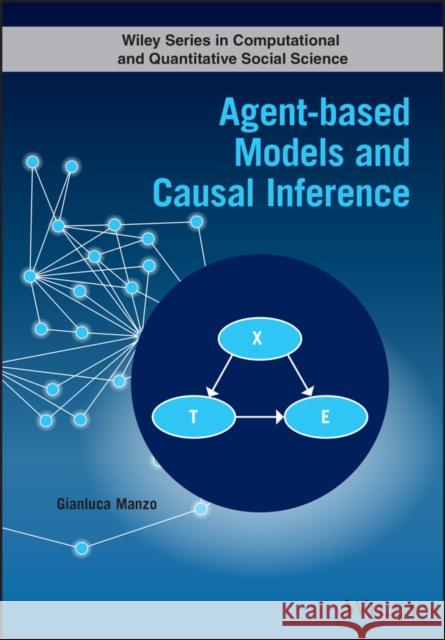Agent-Based Models and Causal Inference » książka



Agent-Based Models and Causal Inference
ISBN-13: 9781119704478 / Angielski / Twarda / 2022 / 176 str.
Agent-Based Models and Causal Inference
ISBN-13: 9781119704478 / Angielski / Twarda / 2022 / 176 str.
(netto: 353,27 VAT: 5%)
Najniższa cena z 30 dni: 366,41
ok. 30 dni roboczych.
Darmowa dostawa!
Scholars of causal inference have given little credence to the possibility that ABMs could be an important tool in warranting causal claims. Manzo's book makes a convincing case that this is mistake. The book starts by describing the impressive progress that ABMs have made as a credible methodology in the last several decades. It then goes on to compare the inferential threats to ABMs versus the traditional methods of RCTs, regression, and instrumental variables showing that they have common vulnerability of being based on untestable assumptions. The book concludes by looking at four examples where an analysis based on ABMs complements and augments the evidence for specific causal claims provided by other methods. Manzo has done a most convincing job of showing that ABMs can be an important in any researcher's tool kit.--Christopher Winship, professor of sociology at Harvard UniversityAgent-based Models and Causal Inference is a first-rate contribution to the debate on, and practice of, causal claims. With exemplary rigor, systematic precision and pedagogic clarity, this book contrasts the assumptions about causality that undergird agent-based models, experimental methods, and statistically based observational methods, discusses the challenges these methods face as far as inferences go, and, in light of this discussion, elaborates the case for combining these methods' respective strengths: a remarkable achievement.-- Ivan Ermakoff, professor of sociology at the University of Wisconsin-MadisonAgent-based models are a uniquely powerful tool for understanding how patterns in society may arise in often surprising and counter-intuitive ways. This book offers a strong and deeply reflected argument for how ABM's can do much more: add to actual empirical explanation. The work is of great value to all social scientists interested in learning how computational modelling can help unraveling the complexity of the real social world.-- Andreas Flache, professor of sociology at the University of GroningenAgent-based Models and Causal Inference is an important and much-needed contribution to sociology and computational social science. The book provides a rigorous new contribution to current understandings of the foundation of causal inference and justification in the social sciences. It provides a powerful and cogent alternative to standard statistical causal-modeling approaches to causation. Especially valuable is Manzo's careful analysis of the conditions under which an agent-based simulation is relevant to causal inference. The book represents an exceptional contribution to sociology, the philosophy of social science, and the epistemology of simulations and models.-- Daniel Little, professor of philosophy at the University of Michigan
List of Acronyms xiList of Tables xiiPreface xiiiThe Book in a Nutshell xviiIntroduction 11 The Book's Question 32 The Book's Structure 6Part I: Conceptual and Methodological Clarifications 91 The Diversity of Views on Causality and Mechanisms 111.1 Causal Inference 111.2 Dependence and Production Accounts of Causality 131.3 Horizontal and Vertical Accounts of Mechanisms 171.3.1 Vertical versus Horizontal View 191.3.2 Horizontal versus Vertical View 211.4 Causality and Mechanism Accounts, and ABM's Perception 222 Agent-based Models and the Vertical View on Mechanism 252.1 ABMs and Object-oriented Programming 262.2 ABMs and Heterogeneity 272.3 ABMs and Micro-foundations 282.4 ABMs and Interdependence 282.5 ABMs and Time 292.6 ABMs and Multi-level Settings 302.7 Variables within Statistical Methods and ABMs 313 The Diversity of Agent-based Models 333.1 Abstract versus Data-driven ABMs: An Old Opposition 343.2 Abstract versus Data-driven ABMs: Recent Trends 363.3 Theoretical, Input, and Output Realism 383.4 Different Paths to More Realistic ABMs 403.4.1 "Theoretically Blind" Data-driven ABMs 413.4.2 "Theoretically Informed" Data-driven ABMs 45Part 2: Data and Arguments in Causal Inference 494 Agent-based Models and Causal Inference 514.1 ABMs as Inferential Devices 524.1.1 The Role of "Theoretical Realism" 524.1.2 The Role of "Output Realism" and Empirical Validation 544.1.3 The Role of "Input Realism" and Empirical Calibration 554.1.4 In Principle Conditions for Causally Relevant ABMs 574.1.5 Can Data-driven ABMs Produce Information on Their Own? 584.2 In Practice Limitations 594.2.1 ABMs' Granularity and Data Availability 594.2.2 ABM's Granularity and Data Embeddedness 614.3 From-Within-the-Method Reliability Tools 624.3.1 Sensitivity Analysis 644.3.2 Robustness Analysis 654.3.3 Dispersion Analysis 654.3.4 Model Analysis 665 Causal Inference in Experimental and Observational Methods 695.1 Causal Inference: Cautionary Tales 715.2 In Practice Untestable Assumptions 735.2.1 RCTs and Heterogeneity 735.2.2 IVs and the "Relevance" Condition 745.2.3 DAGs, Causal Discovery Algorithms and Graph Indistinguishability 765.3 In Principle Untestable Assumptions 795.3.1 RCTs and "Stable Unit Treatment Value Assumption" (SUTVA) 795.3.2 IVs and the "Exclusion" Condition 815.3.3 DAGs and Strategies for Causal Identification 835.3.3.1 DAGs and the "Backdoor" Criterion 835.3.3.2 DAGs and the "Front Door" Criterion 845.4 Are ABMs, Experimental and Observational Methods Fundamentally Similar? 855.4.1 Objection 1: ABM Lacks "Formal" Assumptions 865.4.2 Objection 2: ABM Lacks "Materiality" 895.4.3 Objection 3: ABMs Lack "Robustness" 915.5 A Common Logic: "Abduction" 946 Method Diversity and Causal Inference 956.1 Causal Pluralism, Causal Exclusivism, and Evidential Pluralism 976.2 A Pragmatist Account of Evidence 996.3 Evidential Pluralism and "Coherentism" 1016.4 When is Diverse Evidence Most Relevant? 1046.5 Examples of Method Synergies 1066.5.1 Obesity: ABMs and Regression Models 1066.5.2 Network Properties: ABMs and SIENA Models 1096.5.3 HIV prevalence: ABMs and RCTs 1116.5.4 HIV treatments: ABMs and DAG-based identification strategies 113Coda 1151 Possible Objections 1161.1 Causation is Not Constitution 1171.2 Lack of a Specific Research Strategy 1181.3 A Limited Methodological Spectrum 1192 Summary 121References 127Index 149
Gianluca Manzo is a professor of sociology at Sorbonne University and a fellow of the European Academy of Sociology. He has held various positions at institutions across the world including Nuffield College, Columbia University, the European University Institute (EUI), and the Universities of Oslo, Barcelona, Cologne, and Trento.
1997-2026 DolnySlask.com Agencja Internetowa
KrainaKsiazek.PL - Księgarnia Internetowa









